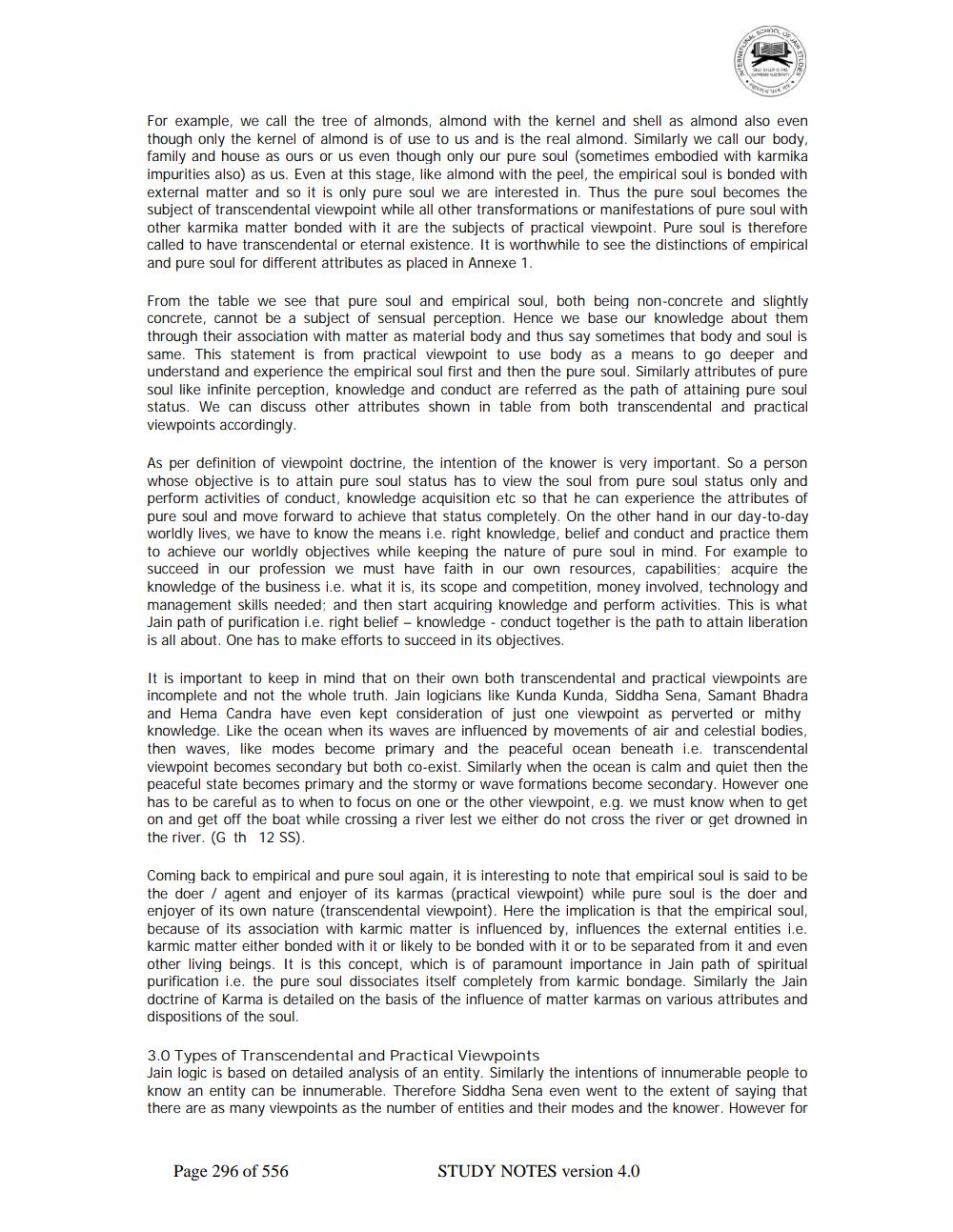________________
For example, we call the tree of almonds, almond with the kernel and shell as almond also even though only the kernel of almond is of use to us and is the real almond. Similarly we call our body, family and house as ours or us even though only our pure soul (sometimes embodied with karmika impurities also) as us. Even at this stage, like almond with the peel, the empirical soul is bonded with external matter and so it is only pure soul we are interested in. Thus the pure soul becomes the subject of transcendental viewpoint while all other transformations or manifestations of pure soul with other karmika matter bonded with it are the subjects of practical viewpoint. Pure soul is therefore called to have transcendental or eternal existence. It is worthwhile to see the distinctions of empirical and pure soul for different attributes as placed in Annexe 1.
From the table we see that pure soul and empirical soul, both being non-concrete and slightly concrete, cannot be a subject of sensual perception. Hence we base our knowledge about them through their association with matter as material body and thus say sometimes that body and soul is same. This statement is from practical viewpoint to use body as a means to go deeper and understand and experience the empirical soul first and then the pure soul. Similarly attributes of pure soul like infinite perception, knowledge and conduct are referred as the path of attaining pure soul status. We can discuss other attributes shown in table from both transcendental and practical viewpoints accordingly.
As per definition of viewpoint doctrine, the intention of the knower is very important. So a person whose objective is to attain pure soul status has to view the soul from pure soul status only and perform activities of conduct, knowledge acquisition etc so that he can experience the attributes of pure soul and move forward to achieve that status completely. On the other hand in our day-to-day worldly lives, we have to know the means i.e. right knowledge, belief and conduct and practice them to achieve our worldly objectives while keeping the nature of pure soul in mind. For example to succeed in our profession we must have faith in our own resources, capabilities; acquire the knowledge of the business i.e. what it is, its scope and competition, money involved, technology and management skills needed; and then start acquiring knowledge and perform activities. This is what Jain path of purification i.e. right belief - knowledge - conduct together is the path to attain liberation is all about. One has to make efforts to succeed in its objectives.
It is important to keep in mind that on their own both transcendental and practical viewpoints are incomplete and not the whole truth. Jain logicians like Kunda Kunda, Siddha Sena, Samant Bhadra and Hema Candra have even kept consideration of just one viewpoint as perverted or mithy knowledge. Like the ocean when its waves are influenced by movements of air and celestial bodies, then waves, like modes become primary and the peaceful ocean beneath i.e. transcendental viewpoint becomes secondary but both co-exist. Similarly when the ocean is calm and quiet then the peaceful state becomes primary and the stormy or wave formations become secondary. However one has to be careful as to when to focus on one or the other viewpoint, e.g. we must know when to get on and get off the boat while crossing a river lest we either do not cross the river or get drowned in the river. (G th 12 SS).
Coming back to empirical and pure soul again, it is interesting to note that empirical soul is said to be the doer / agent and enjoyer of its karmas (practical viewpoint) while pure soul is the doer and enjoyer of its own nature (transcendental viewpoint). Here the implication is that the empirical soul, because of its association with karmic matter is influenced by, influences the external entities i.e. karmic matter either bonded with it or likely to be bonded with it or to be separated from it and even other living beings. It is this concept, which is of paramount importance in Jain path of spiritual purification i.e. the pure soul dissociates itself completely from karmic bondage. Similarly the Jain doctrine of Karma is detailed on the basis of the influence of matter karmas on various attributes and dispositions of the soul.
3.0 Types of Transcendental and Practical Viewpoints Jain logic is based on detailed analysis of an entity. Similarly the intentions of innumerable people to know an entity can be innumerable. Therefore Siddha Sena even went to the extent of saying that there are as many viewpoints as the number of entities and their modes and the knower. However for
Page 296 of 556
STUDY NOTES version 4.0




